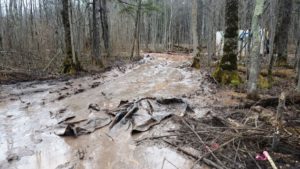
An environmental organization is blaming recent exploratory drilling for making a “mess” of the Porcupine Mountains Wilderness State Park.
The Mining Action Group of the Upper Peninsula Environmental Coalition issued a statement calling for the Michigan Department of Natural Resources to halt any further exploratory drilling in or near the park.
Photographs taking by the group show the impact of the use of heavy equipment on the land during the drilling.
Highland Copper Company conducted the drilling to test the feasibility of mining the Copperwood Project in an area that they own the mineral rights.

Earlier this year, Highland was issued a permit to begin drilling on park land west of County Road 519, work that had to be suspended when warmer weather caused the ground to begin to thaw.
Shortly after, drilling resumed in the CR519 right-of-way with work expected to be completed by the end of the month.
Highland Copper officials say the initial tests look good and the Copperwood mine could create as many as 300 jobs.
Here is the press release from the Mining Action Group, followed by links to related stories:
Houghton, MI — As warmer weather melts the blanket of snow and the ground below, exploratory copper drilling in Porcupine Mountains Wilderness State Park (widely known as “the Porkies”) in the northwoods of Michigan’s Upper Peninsula continues. The result is a big muddy mess, and potential violations of the state’s Natural Resources and Environmental Protection Act, Act 451 of 1994 (NREPA).
“It looks like hell – far worse than I was expecting,” said Steve Garske, UPEC board member. “Considering the exceptional natural and recreational features threatened by this drilling activity, it simply amazes me that the DNR is sitting on their hands and doing nothing.
In February, the Michigan Department of Natural Resources (DNR) issued a surface use permit authorizing Orvana Resources – a subsidiary of Highland Copper – to begin exploratory drilling in the Porkies. The company contracted to do the work is Idea Drilling of Minnesota. The DNR has defended their surface use agreement and the company’s “Environmental Management Plan” as “protective” in press releases and interviews, touting the use of the “least impactful”routes to access drill hole sites, and claiming that drilling would be done in the winter months “to reduce and limit compaction and erosion impacts to soils.”
In its broadly-worded management plan, Orvana promised to follow strict guidelines guaranteed to protect the Porkies from the destruction of public resources, old growth forest, soil erosion and other damage to the land. They claimed that “Wetlands and hydric soils will be avoided” and that “All activities will adhere to the MDNR and MDEQ Sustainable Soil and Water Quality Practices on Forest Land (February, 2009 revision)”. Despite these reassurances, members of the Upper Peninsula Environmental Coalition (UPEC) now report that Orvana’s exploratory drilling work has turned the site into an ugly, mile-long mudhole.
The Porcupine Mountains Wilderness State Park is an all-season draw for the region, well known for its hiking trails, rugged terrain, old growth forests, miles of wild and scenic Lake Superior shoreline, wilderness campsites, rivers, lakes and waterfalls. The “Porkies” have been featured as a premier hiking destination by Backpacker Magazine, USA Today, and other national media. Widely considered the crown jewel of Michigan’s state park system, it is one of the most popular tourist destinations in the midwest. The park is prominently featured in the PURE MICHIGAN tourism campaign: “Undisturbed on the edge of Michigan is an untamed world of uncharted woods and unseen stars…” Visitors are urged to “Come to the Porcupine Mountains (…) and see nature in its purest form.” (See “Pure Michigan’s Porcupine Mountains: Call of the Wild”).
While the Porcupine Mountains Wilderness land is owned by the State of Michigan, County Road 519 is managed by the Gogebic County Road Commission, which issued a permit in February for drilling activity to take place within the “Right of Way” (ROW). The permit states that Orvana must “RESTORE ALL DISTURBED AREAS BACK TO EXISTING CONDITIONS”, a condition that, given the severe rutting and damage, now seems impossible.
According to DNR spokesman John Pepin, Orvana’s management plan only applies to the 12 drill holes that are on State Park land but outside the 466-foot county right-of-way. Yet the plan is carefully worded so that it seems to provide protection to the lands within the right-of-way as well. A subsequent DNR press release (February 23, 2017 – see link below) misleadingly implied that the company would be suspending drilling in the park, stating that “Highland Copper hopes to resume its exploration of the minerals – which are not owned by the State of Michigan – should prolonged wintry conditions return soon to Gogebic County“ and that “The company plans to reassess the situation in a couple of weeks. If exploration is not resumed in March, the drilling program will be postponed until next winter.”
The February 23 press release gave no indication that the company would return to drill in the CR-519 right-of-way during spring break-up, without regard for ground conditions or how much damage they would do. However, a March 15 press release (see link below) quotes Pepin as stating that “This work today does not restart Highland Copper’s exploratory work on park land situated west of County Road 519” and that “Barring a significant return to wintry conditions, there is not expected to be any additional borings on state park land this winter.”
Given the overlapping layers of jurisdiction – mineral rights, surface use agreements, and right-of-way access, it is unclear whether the DNR will enforce any of the provisions of the Environmental Management Plan. According to Doug Welker, former UPEC board member, the DNR has neglected to enforce stipulations in the state’s Wilderness and Natural Areas law (Part 351) which prohibit mineral exploration in designated State Natural Areas. “Drilling within the Presque Isle River Scenic Site is in conflict with State law,” said Welker.
The land east of the road where the most severe damage has been done is part of the Porcupine Mountains’ Presque Isle River Scenic Site, according to Welker. “The legal boundary of the Scenic Site is the road itself, not the east boundary of the right-of-way, according to a rule within the Michigan Administrative Code. The Presque Isle River Scenic Site is a legally-dedicated State Natural Area, and exploration for or extraction of minerals is prohibited in State Natural Areas according to Michigan law (NREPA).”
“Every citizen should be disgusted by the environmental damage being caused by the mineral exploration underway at the Porcupine Wilderness State Park,” said UPEC president Horst Schmidt.
“Although the DNR said Highland Copper would minimize any harm to natural features in the park, the pictures clearly contradict those claims. The DNR needs to stop further exploration drilling while it clarifies the legal status of drilling on State Natural and Wilderness Areas and other protected areas, as required by NREPA Part 351, 324.35102: ‘Wilderness, wild, and natural areas; duty of department to identify, dedicate, and administer.’ We ask the DNR to conduct a thorough investigation of its legal duty on behalf of our wilderness and natural areas,” said Horst.
“If we can’t trust Highland Copper to behave responsibly and take adequate precautions at drilling sites, and if we can’t trust the State to make sure that they do, why should we believe that Highland and the State will act responsibly if mining takes place?” asked Welker.
According to the senior planning team at the Superior Watershed Partnership, “The proposed Porcupine Mountains project seems to ignore sound science, environmental ethics and common sense. The risk is simply too great for groundwater, surface water, Lake Superior and this unique wilderness park.”
“I’ve seen industrial-scale pig farms that made less mud than Highland’s drilling – and this is happening in a State Natural Area! Drilling activity using heavy equipment during spring thaw churns the forest floor into flowing mud, and threatens water quality in nearby streams, rivers and lakes, including Lake Superior. It seems obvious that severe impairment and destruction of our natural resources is taking place. The DNR needs to act quickly to protect our natural resources and the public trust,” said Kathleen Heideman, UPEC board member.
In allowing exploratory drilling in the Porkies, and failing to monitor and regulate the resulting environmental impacts, the DNR has demonstrated a stunning disregard for the health of the land and the wishes of its citizens. “Those who care about Michigan’s future need to remind state representatives and agencies (in this case the DNR) that they serve the public, not multinational mining companies intent on short-term profits at the state’s expense. This is no way to treat our unique Wilderness park,” notes Garske.
“The ‘public’ in public land seems to have no clout. In our name, public lands can be sold, traded, and drilled, often with little or no public input. Shouldn’t there be tighter restrictions on what can be done in a wilderness state park like the Porkies? Why are we stuck in a legal mindset from the 1880s that allows “reasonable” mining exploration in areas where such activity, from a 21st century perspective, is entirely unreasonable?” asked historian Jon Saari, a UPEC Board member.
“The damage and the aggressive nature of these test drilling has to be first stopped, and then understood. No one is doing that,” said Pat Egan, conservation chair of the Three lakes Sierra Group in the Upper Peninsula of Michigan. “The DNR has an obligation, as stewards of the state park, to protect the surface and the commonly owned natural assets of that park. We don’t know if there is permanent damage; as yet, no one does.”
“As people begin thinking about spring and summer camping in the state’s largest and arguably most beautiful state park, they need to know that the DNR and the DEQ are protecting their park,” said Egan.
Environmental Group Outraged Over Porcupine Mountains Drilling
Environmental Group Outraged Over Porcupine Mountains Drilling
Environmental Group Outraged Over Porcupine Mountains Drilling
Environmental Group Outraged Over Porcupine Mountains Drilling
Environmental Group Outraged Over Porcupine Mountains Drilling
 Keweenaw Report Your Source for Local News and Sports
Keweenaw Report Your Source for Local News and Sports





